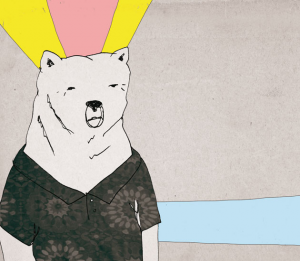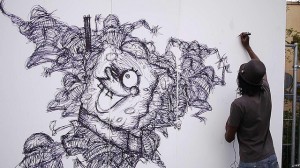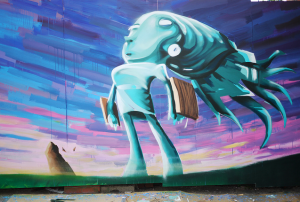Although Britain is not the most bike-friendly country in Europe there are a few cities within the Island that have quickly started to promote & gain a much needed citizen bike-awareness …. in some sort of way. Apparently, our beloved Bristol should be considered as the most successful example coming first in a recent study carried out by Cycling Plus magazine about big bike-friendly UK cities.
A city like Bs, whose public transport is quite lame (expensive buses, infrequent trains…) leaves no other alternative for many than to use such an old & versatile vehicle as the bike, and although this way of transport has become one of the most affordable tools (you can get a refurbished one for around £50) there are still many Bristolians & collectives who cannot afford such a basic tool.
And so, starting 2 years ago in December 2008 James Lucas and Colin Fan (2 landscape monitors) materialised an idea that has already taken off in a few other countries and that had a clear demand in a city like Bristol where the most economic way of transport (many times the fastest) is this pedal-driven one.

Colin & James could be considered as a couple of self-taught bike geeks “just two passionates doing their own mechanics and repairing their own bikes” who despite never being in the industry (they’ve mainly worked in recreational sports & outdoor activities) have become some sort of bike referent in the Bristol area…
Their idea was simple: they take in unwanted bicycles from the general public and go about fixing them up with the help of the service-users who require one. After an afternoon workshop, these get to take their bicycle away with a quality lock and set of lights. And who are those service users who benefit from this “bike ONG”? All sorts of unprivileged collectives; although the BBP started working only with Refugees & Asylum-Seekers at first (via Bristol Refugee Rights) pretty much any marginalised group can benefit from their community service… nowadays they work with people who have been referred to them directly by an organisation or group that can vouch for that person’s status and need for a bike… the homeless, recovering substance-abusers, detached youth groups…
What started as a personal challenge in their back garden & then a horse stable takes now place every Wednesday, Thursday & Friday at the always booked & sometimes overhyped Hamilton House (the major exponent of Stokes Croft’s Artistic transformation). So we got there a couple of weeks ago to get to know a bit more about this project that we truly hope will propagate to many more cities within the UK.
aqnb: before talking about the BBP & having read that survey, you consider Bristol a bike paradise?
Colin: Bristol is not particularly bike friendly, the problem is that our roads aren’t really designed to have cyclists & cars together. There are many bike paths but they aren’t the solution, I personally think integration between cyclists & motorists is the best solution; if you just separate them off it doesn’t do anything because when they got to come together then there’s the conflict. In the end the main problem is that here no-one respects anyone. In many other countries people respect that you are a car or a cyclist and they kind of live on the road together and they understand what they should or shouldn’t do. In the end is a cultural change.

aqnb: moving onto your project, how you came up with the idea?
Colin: The idea already existed but it wasn’t in place, it wasn’t happening. James realised there was a project that was meant to happen which we ended up doing: to facilitate refugees with a bike, this was when he was working in the welcome center for refugees rights down in Easton. The idea did come up in Scandinavia, we wanted to do something bike-related but not something commercial or a bike shop.
aqnb: and from the dream to materialising the idea?
Colin: When we came back from our Scandinavian trip the idea behind the project happened. We started calling friends, sending e-mails to people to see “who’s got an unused bike, or an abandoned one in the shed”. Initially we were just doing it by ourselves in a backgarden and taking the bikes down to the Refugee centre, and giving bikes out. Then we quickly realised it was probably better to include the people and get them to work with us. And it works…we have a core group about 9 volunteers, who have keys and open up the workshop. Then there are like another 20 volunteers, some of them are mechanics. Some people will come in once, two weeks in a row, or a month, sometimes less… we constantly meet new people. Currently we got a waiting list for the next 6 weeks and although I don’t know how many bikes we have received (hundreds), we’ve probably given out more than 300, meaning 300 benefited users.
aqnb: what’s the typical process?
Colin: Basically, the bikes get donated to us, we look over and make sure that they are safe and so we know that they ones going to our workshop will be repairable. If the bike is completely worthless then will strip it down and take the parts that we want from them. We do the hard work if there is any major damage: like servicing the hubs and the bottom brackets and we generally leave things like breaks & gears to do in our workshops. Things that we know that are not going to be a problem and are solvable, so that we can teach our service users and they would do in a future, change the puncture, change the tire… those sort of things.
Typically this workshop is run on Wednesdays (we work with general public) and thursdays. On Monday is solely a women’s workshop, skill sharing (don’t have to be underprivileged), trying to encourage women into cycling. On Tuesday’s nights is singles night… “fixed-gear/ single speed dates” and then Friday is just for volunteers.
We can only do 3 people a day, although the amount of people in the workshop depends on how many people turn up. They come around half one and stay the whole afternoon with us learning & repairing their own bike which they’ll carry out at the end of the workshop.

aqnb: have you heard about this project somewhere else? Been in talks with any other cities volunteers / projects?
Colin: There are other projects happening, not specifically or so specific. We only do this two days a week….It is volunteering, we don’t get paid and we’re quite happy to donate our time. You can’t ask someone to set this up and tell them “you’re not gonna get paid for it”; that’s the main issue. Open up in a different city is more complicated, unless you actually tell them they would be paid. I think the model of people donating bikes and recycling them can work, if it can be set up it would just fleurish, it really can. I know different projects around the country that do similar things, with donated bikes and then giving them out or selling them cheaply but not actually including the people involved in the workshops.
aqnb: Financing? who puts the money? You have t-shirts to sell, paypal donation on your webpage….
Colin: We get money from…. some bikes that we get donated to us and are not very suitable for our workshops so we end up selling bikes like these. We actually sell a lot, we get quite fast turnover, quite a fast movement of bikes that we receive, so people turn up, tell their friends …. (bikes from £50 to £100). We don’t put money from our pockets, all the money we get pays the rent & for buying lots & lights…. we also have people fundraising for us from time to time. We get on-line donations, cheques through the post… a lot of support. People who cannot give us time so they donate money to us, which is brilliant.
Donating a bike can be also a way of donating money to us, as we might be able to sell it. We’re very clear when someone donates a bike to us that if it’s a bike that we can potentially sell we say were the money is gonna go to (rent & keep the project running).
aqnb: thanks a lot Colin
This is the film they shot & uploaded half a year ago on Vimeo regarding the BBP (see our flickr set). It continues to be screened throughout film festivals in the USA. It will be showing at the London Bicycle Film Festival at the Barbican Centre in London on October 13-17th and will then continue to be shown in major cities throughout Europe. For further information you may visit their site, or if you can’t get down to the Hamilton House with that abandoned broken bike of yours (hidden in your shed) you could just donate via their webpage.
The guys at BBP are also editing a cycling mag… “Boneshaker Magazine” (£3.5) which is now available worldwide with their 2nd issue.
















